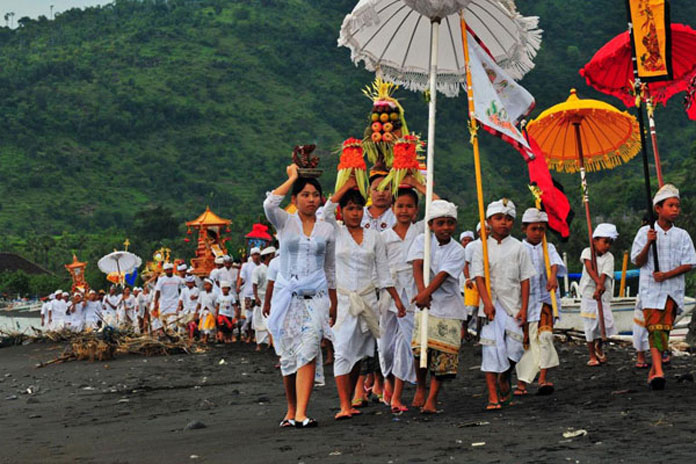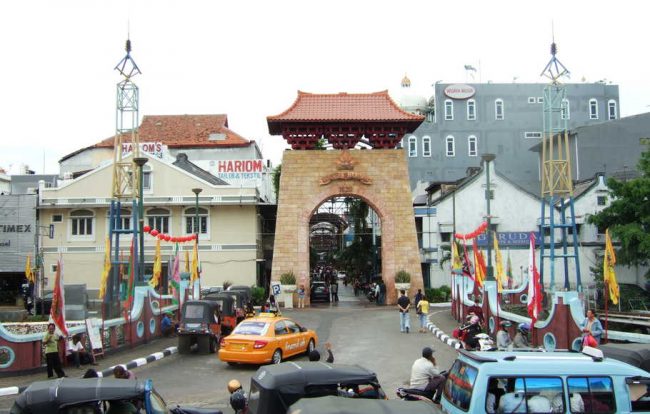
On March 29th this year (1 Saka 1947) Balinese Hindus will celebrate Nyepi or the Day of Silence. Commemorating the start of the Hindu New Year, Nyepi is calculated according to the Saka lunar calendar and falls at the time of the new moon in the months of March or April each year. The coming year will be 1947.
The name Nyepi comes from the root-word “sepi” meaning quiet or silent. Although it is a national holiday enjoyed by Indonesian residents throughout the country, Nyepi is celebrated in particular on the island of Bali where the majority of the 3.5 million inhabitants follow the Hindu religion, as well as in Balinese Hindu communities around Indonesia.
Hinduism in Bali bears only slight resemblance to the religion as it is practiced in India as the tenets of the faith first brought to Bali from the 14th century Majapahit Kingdom of East Java, did not supplant the already existing strong religious beliefs and rich cultural life of the Balinese. Instead, Hinduism was blended with indigenous traditions and beliefs such as animism and ancestor worship to form a new and unique faith.
In Bali religion is a very important part of everyday life and the people perform daily offerings to the gods and actively participate in the numerous temple festivals and rituals. Balinese Hindus also make offerings and perform temple rituals to placate demons that they believe personify the destructive forces of nature. On the day before Nyepi major offerings are made to the demons at village crossroads, where evil spirits are believed to loiter. Before every ceremony a cleaning ceremony or mecaru must be held to drive out the devils and spiritually clean the place.
The rituals actually begin two days before Nyepi with the Melasti ceremony. On this day hundreds of people from each village carry temple artifacts to beaches for purification. The people wear bright clothes and join in colorful processions starting early in the morning. The women carry tall offerings of fruit, cooked rice and natural foods on their heads, while some men walk along holding a long sheet of yellow and white cloth symbolizing the Bridge of God. The elaborate ceremonies continue until early evening and are intended as spiritual purification for the whole village.
The day before Nyepi is known as Tawur Kesanga or Pengerupuk and is the day on which evil spirits are driven away. The villages and neighborhoods are cleaned, food is cooked for 2 days and at dusk people start to bang pots and pans and carry torches through their houses. Then they go outside joining with others to make fearful sounds and sprinkling rice over the alleyways and roads. Demon effigies or huge monsters with bulging eyes made of bamboo, papier-mache and cloth and known as ogoh-ogoh are carried through the streets in torch-lit parades. These demons represent the mythical giant Bhuta Kala and symbolize evil. This is the one day of the year when cock fighting is permitted because the spilling of blood is necessary for the purpose of purification.
At the main crossroads offerings are placed on the ground to entice the demons and evil spirits. The offerings, which are sometimes smelly and include blood – small chickens are sacrificed are for the devils and demons and are always placed on the ground. The offerings for the gods are placed on platforms specially made for this purpose. Once the demons have been lured, the priests then recite curses on them in order to force them to leave the village. Everybody joins in to help by beating pots and tin cans, tooting vehicle horns and making lots of noise. This is called mabuu-buu. Children go around the villages in groups enjoying the fun.
On Nyepi day the Hindu Balinese refrain from all worldly and physical activities for 24 hours. It is customary to practice yoga semedi and catur berata penyepian or the four abstinences. These are: amati geni (refraining from lighting fires and using lights), amati karya (refraining from working), amati lelanguan (refraining from indulging in leisure activities) and amati lelungan (refraining from traveling outside the house). Everyone stays inside their homes but they are not supposed to speak to each other, answer the telephone, receive guests, watch TV, listen to the radio or use any appliances.
Lights must not be turned on and no fires may be lit, including stoves for cooking or even lighting a cigarette. They also refrain from eating and drinking and are not supposed to do any work or engage in any activity.
The time should be spent in silent meditation or performing prayers at the house shrine or merajan. It is a day of self-control and introspection in order to achieve spiritual purification. Streets are deserted with only a few pecalang or community security officers ensuring that Nyepi is observed properly. Only emergency services and hospitals are allowed to operate as usual. Tourists and visitors who happen to be in Bali on Nyepi day must remain inside their hotel complexes where activities can take place as normal. The Ngurah Rai Airport is also closed for 24 hours with no flights arriving or departing on Nyepi day.
The day after Nyepi is called Ngembak Geni. After successfully completing their day of restraint and purification people feel very happy and enjoy going out to visit family and friends to ask forgiveness for past mistakes. Hindu Balinese, wherever they are living, always endeavor to celebrate Nyepi, but it is on the island of Bali itself that you can sense the special nature of this unique holiday.




